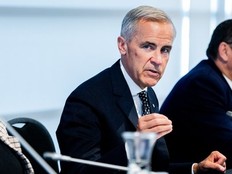Diversifying trade key to building 'resilience' against U.S. tariffs: Macklem

Article content
OTTAWA — Bank of Canada governor Tiff Macklem is encouraging businesses to explore export markets beyond the United States to make the economy less vulnerable to current and future trade disputes.
Macklem, speaking to a business crowd in St. John’s, N.L., on Wednesday, said it was “very welcome news” that Prime Minister Mark Carney and U.S. President Donald Trump agreed at the G7 Summit earlier this week to nail down a new trade and security deal within 30 days.
He said in prepared remarks that progress toward a new trade deal is “encouraging,” but later said in a moderated question-and-answer period that Canada’s economy faces bigger problems in an increasingly “fragmented world.”
Trade patterns were already shifting before Trump was re-elected late last year, Macklem noted, and other global conflicts are also forcing businesses to reorient supply chains.
“I really hope we get a deal, I really hope it’s a good deal, but that’s not going to solve all our problems,” he said.
Disruptions during COVID-19 showed Canadian firms the consequences of not having diverse supply chains, Macklem said. And he said the current trade dispute is demonstrating how vulnerable businesses can be without diverse export markets.
“Growing new markets for our exports builds scale and competitiveness. But there’s an added imperative — diversification adds resilience,” he said in his speech.
Macklem used Newfoundland and Labrador as a case study for his point, noting that only a third of the province’s goods exports head to the United States compared with roughly three-quarters for the rest of Canada. Most of the province’s oil is now shipped to Europe and other countries, for instance, and services exports are boosting the St. John’s tech sector, he noted.
Macklem said the rest of Canada has an opportunity, particularly among services exports, to expand trade beyond the United States. Efforts to build national infrastructure and tear down interprovincial trade barriers would also make diversifying goods exports easier, he said.
The United States will always be Canada’s biggest trading partner, Macklem said, but he believes the recent tariff dispute has awoken businesses and policymakers to long-standing vulnerabilities in the economy by being so focused on cross-border trade.
“This is something we’ve been talking about for a long time in this country,” he said during the Q&A. “The reality is, we’re just leaving money on the table by not building our own internal market, by not developing our overseas markets.”
The Bank of Canada held its benchmark interest rate steady at 2.75 per cent for the second time in a row earlier this month.
The central bank’s next decision is set for July 30, and Macklem reiterated that future cuts could be in the cards if economic growth weakens further but inflation remains contained in the trade dispute.
While labour market impacts are largely concentrated in trade-sensitive sectors so far and other industries are still showing some growth, Macklem said that, “if demand stays soft, at some point more businesses will cut jobs.”
Tracking inflation’s response to tariffs is “complicated,” the central bank head noted. A slower economy dampens price pressures but the tariffs themselves can make goods more expensive for Canadians.
While the removal of the consumer carbon price helped push inflation down to 1.7 per cent in April, inflation excluding taxes was 2.3 per cent in the month, which Macklem said was “slightly stronger” than the Bank of Canada expected.
He said core measures of inflation were also showing “unusual volatility” and “could be firmer” than the central bank thought. Macklem pointed to higher goods prices affecting the underlying inflation figures, which could be starting to reflect new costs related to tariffs.
“The prospect of a new Canada-U.S. trade deal offers hope that tariffs will be removed. But until we have a deal, inflation will be affected by both U.S. tariffs and Canadian counter-tariffs,” he said.











Postmedia is committed to maintaining a lively but civil forum for discussion. Please keep comments relevant and respectful. Comments may take up to an hour to appear on the site. You will receive an email if there is a reply to your comment, an update to a thread you follow or if a user you follow comments. Visit our Community Guidelines for more information.